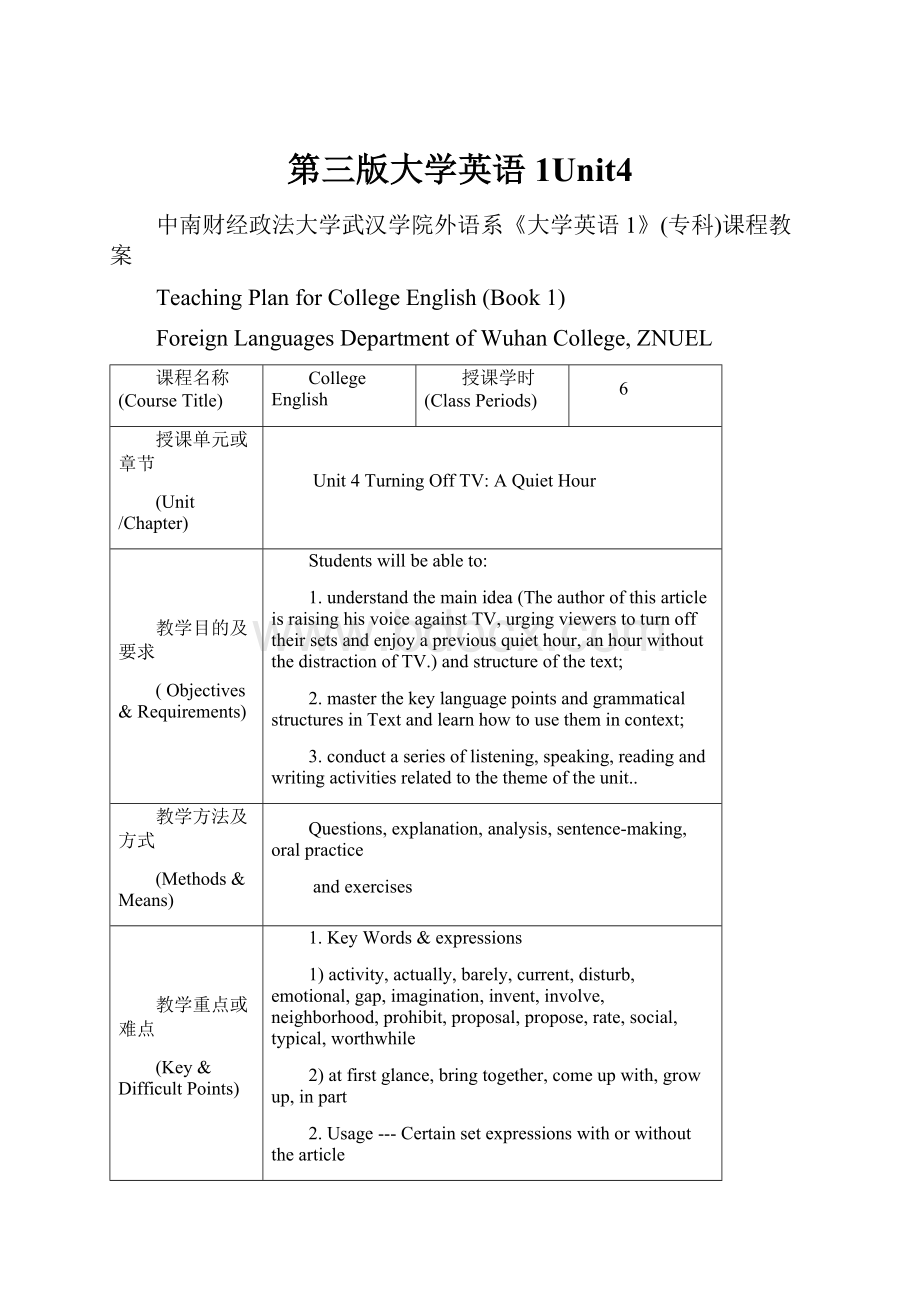第三版大学英语1Unit4.docx
《第三版大学英语1Unit4.docx》由会员分享,可在线阅读,更多相关《第三版大学英语1Unit4.docx(22页珍藏版)》请在冰豆网上搜索。

第三版大学英语1Unit4
中南财经政法大学武汉学院外语系《大学英语1》(专科)课程教案
TeachingPlanforCollegeEnglish(Book1)
ForeignLanguagesDepartmentofWuhanCollege,ZNUEL
课程名称(CourseTitle)
CollegeEnglish
授课学时(ClassPeriods)
6
授课单元或章节
(Unit/Chapter)
Unit4TurningOffTV:
AQuietHour
教学目的及要求
(Objectives&Requirements)
Studentswillbeableto:
1.understandthemainidea(TheauthorofthisarticleisraisinghisvoiceagainstTV,urgingviewerstoturnofftheirsetsandenjoyapreviousquiethour,anhourwithoutthedistractionofTV.)andstructureofthetext;
2.masterthekeylanguagepointsandgrammaticalstructuresinTextandlearnhowtousethemincontext;
3.conductaseriesoflistening,speaking,readingandwritingactivitiesrelatedtothethemeoftheunit..
教学方法及方式
(Methods&Means)
Questions,explanation,analysis,sentence-making,oralpractice
andexercises
教学重点或难点
(Key&DifficultPoints)
1.KeyWords&expressions
1)activity,actually,barely,current,disturb,emotional,gap,imagination,invent,involve,neighborhood,prohibit,proposal,propose,rate,social,typical,worthwhile
2)atfirstglance,bringtogether,comeupwith,growup,inpart
2.Usage---Certainsetexpressionswithorwithoutthearticle
3.structure---
1)takearide,payavisitto,have/takearest,haveatalk,haveadiscussionon/about,takealastlook
2)subjunctivemood:
with…./without….;propose/suggestthat…..;Myproposalisthat…
3)presentperfecttense:
Ithasbeen/is…since….
4.DiscourseAnalysisoftheStory
教学进程或步骤
(Procedures&Steps)
Warm-upquestionsandgroupdiscussions;
1.Globalreading:
textorganization,maininformation;
2.Detailedreading:
difficultsentences,languagestudy;
3.Postreading:
usefulexpressions,reflectionsonthetext;
4.Checkonhomework;
5.Furtherstudyandpractice
教学内容
(Contents)
1.Warm-UpQuestions
ⅠDoyouoftenwatchTV?
Whyorwhynot?
ⅡWhataredisadvantagesofwatchingtoomuchTV?
WhatTVprogram(s)doyoulikebest?
Why?
2.Globalreading:
Textorganization
Part1(paras1):
Theauthorproposesthateveryevening,for60to90minutes,alltelevisionbroadcastingintheU.S.beprohibitedbylaw.
Part2(paras2-5):
TheauthormentionssomeproblemscausedbywatchingtoomuchTVandsuggestssomeactivitiestofillthetimewhenturningoffTV.
Part3(paras6):
PeoplecouldhavemorefuniftheyturnedoffTVforoneortwohourseverydayastheydidinthepast.
3.Detailedreading:
difficultsentencesanalysis,languagestudyandpractice(Seelecturenotes);
4.Usage:
Certainsetexpressionswithorwithoutthearticle
6.Structure:
1)takearide,payavisitto,have/takearest,haveatalk,haveadiscussionon/about,takealastlook
2)subjunctivemood:
with…./without….;propose/suggestthat…..;Myproposalisthat…
3)presentperfecttense:
Ithasbeen/is…since….
7.Homereading:
TheNewToy
1)Maininformation;
2)Textorganization;
3)Reflectionsonthetext.
课后作业
(Assignments)
1.Topicforwriting:
TheDisadvantagesofWatchingTV
2.Homereading:
TheNewToy
3.PrepareUnit5
主要参考资料
(References)
LongmanDictionaryofEnglishLanguageandCulture.LongmanGroupUK.
OxfordAdvancedEnglishDictionary.OxfordUniversityPress
CollegeEnglish(Thirdedition)IntensiveReading1Teacher’sBook
《新英汉词典》.上海译文出版社
章振邦主编.《新编英语语法教程》.上海:
上海外语教育出版社,1999.
张道真.《现代英语用法词典》.上海:
上海译文出版社,1983.
备注
(Notes)
任课教师签名:
LectureNotes
BeforeReading:
Warm-UpQuestions
1.DoyouoftenwatchTV?
Whyorwhynot?
2.WhatTVprogram(s)doyoulikebest?
Why?
3.WhataredisadvantagesofwatchingtoomuchTV?
IntroductoryRemarks
Television,sinceitsfirstprevalenceoverradiointhe1950s,hasplayedamoreandmoreimportantroleinpeople’slives.Asamatteroffact,ithasbecomesomuchapartofhumanlifethatamodernworldwithouttelevisionisunimaginable.Somepeopleevensaythatlifewithouttelevisionisnotworthliving.Butsome,ontheotherhand,argueagainstTV.TheythinkTVistakinguptoomuchofaperson’stimeandmakinghimlazy,nottomentionitsharmfulinfluenceuponhim.Theauthorofthisarticle,forexample,israisinghisvoiceagainstTV,urgingviewerstoturnofftheirsetsandenjoyapreciousquiethour,anhourwithoutthedistractionofTV.
ThisarticlewasfirstpublishedinNewsweekin1976.
IntroductoryQuestions
1.SomeworthwhileprogramsarementionedintheEditor’sNote.Whatarethey?
Canyoucitesomeofthem?
(News,educationalprogramsforchildren,plays,movies,concerts,etc.)
2.WhatdoesMayersuggestinhisarticle?
(HesuggeststhatTVbroadcastingbeprohibitedforanhourorsointheevening.)
3.Duringthatquiethour,whatmightthefamilydowithoutthedistractionofTV?
(Theymightsitaroundtogetherandtalktooneanother.)
4.Whatwouldbetheimmediateresultifthefamilymemberscouldusethatquiethourtodiscusstheirproblem?
(Theywouldgettoknoweachotherbetterandtolikeeachotherbetter.)
5.Whatotheractivitiescouldfamiliespursuebesidessuchconversations?
(Theycouldtakearidetoseethesunsetortakeawalktoseetheneighborhood.)
6.Whatwouldhappenifthefamilycouldspendthequiethourreadingbooks?
(Amoreliteratenewgenerationwouldappear.)
7.Whatdoestheauthorsuggestasanalternativetosilentreading?
(Hesuggestsreadinggoodstoriesaloud.)
8.Whatgoodeffects,accordingtoMayer,mightbeproducedonTVprogramsishisproposalwereaccepted?
(TVnetworkswouldbeforcedtocomeupwithbettershows.)
9.HowdidAmericansusetospendtheirsparetimebeforeTVcametocontroltheirlives?
(Theyusedtospendsparetimepartlywithradio;alsowithreading,learning,talking,playinggames.)
10.WhatdoyouthinkofMayer’ssuggestion?
Willitbeacceptedornot?
Whyorwhynot?
(Hissuggestionsoundsreasonablebuthardtobeputintopractice.Noonewillgiveupsomethingwhichhasbecomesomuchapartofhislife—notevenforanhour.)
PartDivisionoftheText
Part
Lines
MainIdea
1
1—3
Theauthorproposesthateveryevening,for60to90minutes,alltelevisionbroadcastingintheU.S.beprohibitedbylaw.
2
4—28
TheauthormentionssomeproblemscausedbywatchingtoomuchTVandsuggestssomeactivitiestofillthetimewhenturningoffTV.
3
29—42
PeoplecouldhavemorefuniftheyturnedoffTVforoneortwohourseverydayastheydidinthepast.
FurtherUnderstandingoftheText
ForPart1
1.TrueorFalseJudgment
Direction:
ThefollowingTrue/Falseexerciseisdesignedtohelpthestudentstoobtainageneralideaofthetext.Thestudentsareexpectedtorepeatastatementifitistrue,andtocorrectthestatementifitisfalse.
1)TheauthorfeelsthattheamountoftimehiscountrymenspendonwatchingTVistoomuch.(T)
2)TheauthorproposestostopthetelevisionbroadcastingoneveningnewsintheUnitedStates.
(F)
TheauthorproposestostopthetelevisionbroadcastingrightaftertheearlyeveningnewsintheUnitedStates.
3)ThetimesuggestedbytheauthortoturnofftheTVis90minutes.
(F)
ThetimesuggestedbytheauthortoturnofftheTVis60to90minutes.
2.MultipleChoice
Whatfunctionsdoesthefirstparagraphserve?
A)Introduction
B)Describingtheproposalindetail
C)Explainingwhytheauthorputforwardhisproposal
Key:
A
ForPart2
1.Scanning
Discussion:
ReadthetextandsummarizethebenefitsofturningoffTVforanhour.
Peoplecould
1)communicatewitheachotherbetter
2)findmoreactiveentertainments
3)readbookssothattheyarewell-educated
4)readstoriesaloud
5)watchthesunset
6)seetheneighborhood
7)mightcomeupwithbetterprograms
2.BlankFilling
Directions:
Findspecificdetailstosupportthefollowingargument.
Argument
IwouldliketoproposethatalltelevisionbroadcastingintheUnitedStatesbeprohibitedforsixtytoninetyminutesbylaws.
SupportI
LessfamilycommunicationswereresultedfromthedistractionofTV.
SupportII
FamiliescoulddiscovermoreactivepastimesratherthanjustsitrootedinfrontofTV.
SupportIII
WithfreetimeandnoTV,childandadultswouldbebetter-educatedbymeansofreading.
SupportIV
Asanalternativetosilentreading,readinggoodstoriesaloudcanbringfamilycloserandalsoforceTVnetworkscomeupwithqualityprograms.
Conclusion
AnhourwithoutthedistractionofTVisnotradicalatall.
ForPart3
Questions
1.WhydoestheauthorthinkthatitmightberadicaltoAmericansatthefirstglance?
2.HowlonghastheTVcontrolledtheAmericans’life?
3.Whatisthepurposeoftheexampleinthelastparagraph?
LanguageStudy&DifficultiesExplanation
LeadIn
1.spendtimedoing
2.freetime:
sparetime
3.worthwhile:
adj.thatisworththetime,effort,etc.;needed;valuable值得花时间等的;有价值的(句子中作表语,定语或宾语补足语)
aworthwhileexperiment,aworthwhilebook
AvisittoLondonwillalwaysbeworthwhile.
Sofewmoviesareworthwhilenowadays.
Iboughtsomeworthwhilebookslastterm.
Ithinkitworthwhiletoaskhimtojointheclub.
Itisworthwhiletodo/doingsomething
Itisworthwhilereadingthebook.
worth值...,作表语形容词,其后必须接宾语,表示"价钱,代价",该词不能作定语.
Thebikeisworth300Yuan.
当worth后接动名词作宾语时,表被动意义.
Hissuggestionisworthconsidering.
如:
a.Itisnotworthmorethan£2.
b.Itisnotworththepaperitisprintedon.
(这还不值印刷的纸钱。
)
c.Thebookiswellworthreading.(worth后接动名词,用主动表被动)
d.Itisworthwhiletocomeallthewaytoseethescenicspot.
worthy:
意为"值得,配得上的",可以与介词of搭配,后接宾语.
Hisbehaviorisworthyofgreatpraise.
注:
worthyof接动名词作宾语时多用被动词态.
Hissuggestionisworthyofbeingconsidered.
worthy作表语,还可以接不定式
Sheisnotworthyto